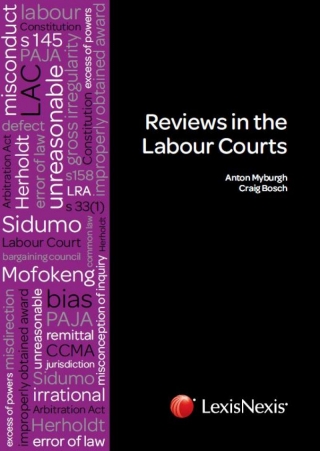Tunnel Vision? The effect of retrospective back pay awards
Labour law is not punitive in nature as compared to civil or criminal law. As a result, when Commissioners consider the facts argued at arbitration, their awards need to be fair and reasonable. Careful deliberation needs to be made not to overstep their powers.
In general, a claim for damages can be instituted for reputational, medical, actual and patrimonial harm, to name a few. However, in labour law, the primary relief claimed by an aggrieved party is reinstatement. Reinstatement can be with or without back pay for the months the former employee was unemployed, particularly if the dismissal is found to be both substantively and procedurally unfair. What needs to be taken into consideration is the reasonability of the award, which we will examine as per the case law below.
In a recent judgment of Maroveke v Talane N.O and others (2021) JOL 50670 (CC), the Court had to determine the appropriateness of the back pay awarded to an employee whose dismissal had been declared unfair. Maroveke (the "applicant") was employed as an artisan and mine technician by Fermel (Pty) Limited, a company that provides technical services to mining companies. The Applicant commenced his employment on the 15th of October 2007. On the 25th of June 2009, the Applicant received a distress signal to attend to a breakdown in a mine. He was with a colleague when he drove a company vehicle through an underground tunnel. The company vehicle sank as the vehicle could not withstand the depth of water, and the Applicant was unable to drive it out. As a result, the engine failed. Later that day, the vehicle was towed to the workshop. One of the officials, namely Engelbrecht, had concluded that the Applicant was responsible for the damage to the vehicle and further told him that the cost of the repairs would be approximately R100 000. Engelbrecht produced a loan form for the amount and instructed the Applicant to sign it. The Applicant refused and demanded that the engine be inspected. He also sought a report setting out the extent and calculations of the damage. The Applicant was informed that due to his refusal to sign the document, he would be charged for misconduct and subjected to a disciplinary hearing. On the 6th of July 2009, a disciplinary hearing was held and he was found guilty on the basis that the applicant "could have foreseen that there could be potential damage to the vehicle after he drove it into the water". An expert report regarding the damage to the vehicle was not presented during the hearing, nor was a copy given to the Applicant. The Applicant was also not afforded an opportunity to deal with the report during his evidence. The chairperson of the hearing, however, considered the report during the determination of an appropriate sanction. On the 16th of July 2009, the Applicant was dismissed. The Applicant secured employment two months after his dismissal.
The matter was referred to the CCMA as an unfair dismissal dispute whereby the Commission viewed the Applicant's dismissal as both procedurally and substantively unfair on the basis that the damage report was not provided to the Applicant. As a result, the Commissioner awarded reinstatement. The company took the award on review to the Labour Court. The Labour Court held that the Commissioner's decision was fatally flawed and set aside the award and replaced it by stating that the Applicant's dismissal was procedurally and substantively fair.
The Applicant referred the matter on appeal to the Labour Appeal Court, which then found that not all evidence that was before the CCMA was before the Labour Court and decided to set the Labour Court's decision aside and remitted the matter back to the CCMA to be heard afresh by a new Commissioner.
On the 14th of October 2014, the matter came before a new Commissioner at the CCMA who held that the Applicant had, under the circumstances, acted as a reasonable driver and maintained his conduct in terms of the company policy. Therefore, negligence for the charge of misconduct had not been established. The Commissioner concluded that the employer had failed to prove the misconduct and accordingly held that the dismissal was substantively unfair. The Commissioner issued an award of reinstatement retrospectively from the 1st of November 2013 with back pay equivalent to 12 months' remuneration.
The Applicant applied for a variation of the award. This was on the basis that the back pay as per the award was calculated on the same scale from the date of employment to the date of the arbitration award. This was acceded to by the Commissioner. Thus, the back pay due to the Applicant increased from R135 536.28 to R469 256.88. The company took the award on review to the Labour Court, which agreed with the Commissioner's view that the dismissal was substantively unfair and that the order for reinstatement was appropriate.
Important to note, however, is that the Labour Court did not concur with the order for 12 months retrospective back pay. The Court further stated that in keeping with the established principle that reinstatement ought to neither impoverish nor enrich the employee but restore them to the position they would have been in, but for the dismissal. In this case, the employee was only unemployed for two months until he gained employment, and therefore, the retrospectivity was indeed unreasonable in the circumstances. The Labour Court set aside the CCMA award and replaced it with an order reinstating the Applicant with effect from the 14th of October 2014, being the date of the arbitration award, with back pay equivalent to two months' wages. The Applicant took the Labour Court's decision on appeal. The Labour Appeal Court, however, dismissed his application for leave to appeal.
The matter was taken by the Applicant on appeal to the Constitutional Court ("CC"), claiming an element of infringement of the right to fair labour practices. The CC considered the order by the LC and had a distinct issue with the portion of the order for retrospective back pay. The CC held that in restoring the Applicant to his previous position, this Court ought to have considered both the amount he would have earned but for his dismissal and what he earned while working at Gold Fields. As far as this is concerned, the Labour Court did not set out the facts it considered in terms of the Applicant's earnings. It was only alluded to from written submissions that the CC requested from parties that the Applicant earned considerably lower wages at the new employer than what he earned at the time of his dismissal.
The CC considered whilst employed by the previous employer, the Applicant earned R24 730.60 per month. At Gold Fields (new employer), he earned R15 000.00 per month. The difference between the salaries is R9 730.60 per month. This would mean that the total difference in earnings for the period of 10 months is R97 306. In the Court's view, the Applicant's diligence and good fortune in finding employment should not prejudice him from receiving what is due to him.
The Applicant was entitled to payment of R49 461.20, which was two months' back pay, and R97 306, being the total difference between what he earned whilst in the third respondent's employ and his earnings at Gold Fields for the period of 10 months. This means that the Labour Court had to set the order aside and replaced it with an order that the third respondent should pay the Applicant an amount of R146 767.20.
In conclusion, the Constitutional Court held that the Labour Court should have taken the salary difference into account when determining the back pay. Retrospective back pay should not be viewed through a ‘tunnel’ but rather seen from all angles in order to have reasonable and fair outcomes.
Article by:
Natasha Govender
Natasha is a Dispute Resolution Official and Collective Bargaining Co-ordinator for the Consolidated Employers Organisation (CEO SA)
Three top tips for executives going on Christmas vacation
By Signium Africa
You can’t have a real vacation if everything in your environment reminds you of business pressures and family responsibilities. You don’t have to go overseas, just somewhere different. It could be a game lodge in the bush, a holiday at the coast, camping by a dam, or simply staying in an unfamiliar town.So, if you’re a busy executive, treat your partner, your kids and yourself to a new experience. There will be plenty time for inlaws, friends and business when you get back.
Mosima Selekisho, Director: Executive Search - Pace your vacation timeTry to break your holiday into three phases: relaxation for winding down; rejuvenation for enjoying yourself; and reactivation to prepare for your return. Ideally, you need three weeks - one for each phase - but if you have less time, divide it into these stages anyway.As a competitive leader, your first instinct might be to jump on a jet ski or go skydiving. Rather opt for a good massage at the local spa, sunbathing on the beach, or anything else that lets your body rest and your mind drift. You need this.By the second phase, you’re ready to get out and have as much fun as possible, having forgotten other concerns. In the third phase, you can still have fun while making time to dream of what the new year holds in store and any positive actions you intend to take on your return.
Michelle Moss, Director: Assessments - Take a digital vacationOur devices have become a part of our daily lives so it’s difficult to switch off and disconnect for any period of time, especially for the always-on executive. Even going on holiday, we use our phones for electronic flight boarding, booking into hotels, hailing ride-sharing services, finding interesting dining and entertainment venues, taking photos and more.Yet, the more disconnected your vacation, the quicker you’ll be able to settle into the holiday spirit. Try these tips: leave your devices at home - you, your partner and your kids. Take only a single phone for emergencies, preferably with a new SIM, and share the number with a select few contacts. And switch it off when you’re not using it. For taking photos, bring along a digital camera so there’s no excuse to check emails in between.Have a great holidayIn a nutshell, disconnect digitally, mentally and physically to get the most from your vacation. Finally, from all of us at Signium, have a very Merry Festive Season and a Happy New Year.
Signium Africa (previously Talent Africa), a leading South African-based executive search and talent management company servicing sub-Saharan Africa.
www.signium.co.za
Human Resource Management: A Profession Overview
Study Nated's Human Resource Diploma provides students with fundamental knowledge about human resource management (HRM)
Our National Human Resource Diploma has been designed to meet the needs of those people wanting to become successful human resource professionals, as well as those who are responsible for managing people and who are concerned with designing, implementing and maintaining HRM practices within their workplaces.
With more and more businesses seeing HR as a strategic business function, you will be well placed for a rewarding career with your National Certificate and National N. Diploma in HR Management. These qualifications are SAQA accredited, employer recognised and offered by the Department of Higher Education and Training.
What do professionals in HR careers do?
Today, business success depends on the careful management of all resources, including human capital. Workers at all levels contribute to their employer’s sustainability and profitability. HR management maximises those contributions by carefully overseeing recruiting, hiring, training, compensation and benefits.
HR managers often consult with top management on the organisation’s direction, employee development, and strategic planning. They help their companies remain viable by attracting top talent, recruiting the best candidates for each position and enabling employees to develop their skills and talents for their own benefit and that of the company.
HR managers connect the value of human capital to the company’s bottom line. They are adept at dealing with people from all backgrounds and levels of experience, knowledge, and skill. Some of the required attributes to succeed as an HR manager include flexibility, patience, attention to detail, outstanding communication and listening skills, negotiation skills and professional discretion.
Benefits of Working In Human Resources
- Working with many types of professionals: HR professionals work closely with people at every stage of their careers.
- Variety: There is no typical day in HR. You’ll likely be working on a variety of tasks, from staffing a booth at a recruitment fair to leading a training class.
- Challenges: HR is an evolving science and art. There are always new strategies, technologies, and skills to learn and improve upon.
- Focus on the big picture: HR professionals participate in long-range planning, with insider views on how the entire organisation works.
- Flexibility: HR professionals are needed by businesses of every size, in every industry. You can put your skills and knowledge to work just about anywhere.
HR Career Paths
Many entry-level HR jobs require a minimum level of education, as well as experience, which can often be obtained through internships, temporary positions or part-time jobs. These introductory positions offer a realistic view of the profession and the company and may lead to a permanent, full-time job offer as an HR assistant or other entry-level position.
HR assistants often move into professional-level roles, such as recruiting manager, payroll manager, staffing manager, administrator or human resources manager. Most HR professionals choose between two broad paths: generalist or specialist.
- Generalist – HR generalists often perform a wide variety of tasks. They do recruit, hiring, training and development, compensation and planning. They often develop personnel policies and ensure that the organisation is in compliance with all federal, state and local labor laws. Job titles held by HR generalists include HR assistant, HR manager, and chief HR officer.
- Specialist – HR specialists typically work in larger organisation. Compared to generalists, they have a higher level of technical skill and knowledge in specialised areas, such as workforce planning, HR development, rewards, employee and labour relations, and risk management. Job titles include recruiter, retention specialist, compensation specialist, labour relations manager, safety officer, risk management specialist, benefits analyst, and trainer.
Benefits of a National Human Resources Diploma Course
Professionals frequently come to HR careers from widely diverse professional backgrounds. Some start in administration and then begin to focus on HR tasks. Still, other professionals may decide to move into HR, take appropriate courses, earn certifications, and then enter the field.
Continuing education programs such as diploma courses can also help you enter the HR field. These can help those already in human resources advance into positions of more responsibility. This designation and others like it show a commitment to excellence and ongoing growth in the field. Learn more about human resources curriculum on https://ibtc.co.za/national-qualifications/
Don’t be distracted from your pursuit of executive success
By Auguste (Gusti) Coetzer* (www.signium.co.za)
A growing mismatch is becoming apparent between the behaviour of international corporate achievers and their South African counterparts. Offshore, upwardly mobile executives increasingly embrace ‘Deep Work’ and reduce distractions as they strive for quality outcomes and the type of successful track record that ensures progress up the corporate ladder.
In contrast, local executives often spend hours in inconclusive meetings, happily endure distraction via smart devices and seem to accept the curse of constant connectivity and 24/7 availability.
We see distraction aversion overseas versus distraction acceptance locally. What prompts the mismatch? The catalyst was probably Professor Cal Newport’s ‘Deep Work: Rules for Focused Success in a Distracted World’. In the book and several academic papers, he defined deep work as professional activities in a state of distraction-free concentration that push cognitive abilities to their limit.
These efforts create new value, improve your skill and are hard to replicate. Writer and entrepreneur Jason Fried also published several books on the need to exclude distractions as a prerequisite for higher personal productivity and the enhanced ability to deliver at an elite level.
The literature continues to grow as consultants and writers contribute how-to articles on the ways in which achievers can limit distraction, boost productivity and inject meaning and pride into their work through elegant outcomes and quality improvements. Ideas include ‘Do Not Disturb’ signs outside the offices of those committing time to deep work, switching off cell phones, leaving work promptly, limiting the pester power of colleagues who fail to respect personal time and cutting down on meetings and the time spent on emails.
Study of corporate realities in a distracted world highlight worrying trends. For instance, in some cases the email in-tray set daily priorities rather than business imperatives.
Deep work’s attractions were then underlined by studies into the real cost of multi-tasking and revelations that productivity does not rise, but falls as a result of ‘shallow work’. One study suggested task-switching could cut productivity by 40%. Scientists also revealed that dopamine, a substance found in our brains, is depleted by incessant hyper-stimulation. This chemical drives motivation, increases focus and drives us to action.
As deep work caught on, it was found that deep thinking without interruption enabled better concentration and fostered new insights as fresh neural pathways opened up in the brain. Initially, bosses may have been miffed by subordinates who failed to respond instantly to messages. But the rationale (‘I never take calls when I’m hard at work’) was soon taken on board, especially when deep work began to deliver qualitative benefits.
It’s simple enough to test the anti-distraction case. Leave work on time. Switch off your cellphone and smart devices. Enjoy a proper night’s sleep, without having to answer late-night calls. When arriving at work ignore emails. Early in the day after a zero-distraction evening you are rested, relaxed and creative. Use this time for deep work. Emails come later. Contrast the frustration you often feel with your satisfaction after successful immersion in a single task and its completion.
Frustration is often traceable to the time spent taking trivial calls when you should be doing something productive or wasting time in unnecessary meetings. Deep work rescues you from these traps and frees you to achieve … for the sake of the business and your own career.
*Auguste (Gusti) Coetzer is a Director of Signium Africa (previously Talent Africa), a leading South African-based executive search and talent management company servicing sub-Saharan Africa.
Website: www.signium.co.za
Tel: +27 11 771 4800
Issued By: Tale Spin Media & Marketing
Zelda Williams 082 461 0689
Leadership going up a gear
Leadership going up a gear by Mosima Selekisho* director at Signium Africa (www.signium.co.za)
Corporate leadership in South Africa is being redefined. A ‘safe pair of hands’ is still required, but increasingly the focus is shifting to greater dynamism. At CEO level, more and more organisations are looking for go-getters who deliver results at pace. The change has been evident for some time but has reached critical mass in recent months as economic prospects have improved and private sector companies have sensed that opportunities for meaningful growth are at hand. Until recently, the incumbent CEO was often seen as the school principal who made sure everyone did their homework and stayed on top of their assignments.
This is changing at many firms. They have faced an economy in limbo for long enough and don’t want their own business to be locked in neutral forever. The demand is for an energetic motivator who does not waste time on formalities and drives hard for discernible results. In the past, the C-suite was characterised by emphasis on processes and detail. Research could be painstaking. Strategic deliberations might take months. Mistakes were avoided.
Costs were tightly controlled. But fast action to exploit fleeting opportunities was rarely seen. In contrast, the new priority when top talent is being sought is for an action man (or woman) who can turn strategy into reality without delay. The newcomer is expected to be technically accomplished, and relative youth is seen as an asset.
Industry outsiders may well make the shortlist, especially if a strong technically adept team is already in place. Some boards of directors are happy to press the ‘fast forward’ button, but still require the reassurance that solid foundations will not be compromised. In this scenario, they may specify a go-getter CEO who will be expected to work with a senior team capable of providing balance and continuity. Alternatively, the board may prefer to appoint a youngish operations officer, known for dynamism and results orientation. In these circumstances, the COO’s job is often beefed up to include a strategic dimension.
The incentive for the incoming COO is that the scene is clearly being set for the newcomer to take the top job once initial dynamism is tempered by greater acquaintance with company culture. In all scenarios, the new CEO or member of the leadership team is expected to be on top of digital developments and new media platforms. The days are gone when CEOs regarded digital devices and communication as something their PAs sorted out.
Feedback following the placement of this new generation of CEOs is largely positive. Many organisations are ripe for reinvigoration and a rapid mood change can be achieved. However, one shortcoming has been noted. The go-getter looks for results rather than consensus. Therefore, listening skills may require work. The public sector has yet to embrace the need for more aggression and dynamism at the top.
A deliberate ‘team player’ is the standard requirement. However, SOEs know times are changing and sometimes a preference is expressed for ‘a new face without baggage’. The good news is that a fresh breed of leaders is emerging and is fully capable of optimising the potential for a new beginning within major organisations … private or public.
*Mosima Selekisho is a Director of Signium Africa (previously Talent Africa), a leading South African-based executive search and talent management company servicing sub-Saharan Africa. www.signium.co.za
Shadow director jeopardy stalks SA advisory boards
By *Gusti Coetzer (Signium Africa) and **J Michael Judin (Judin Combrinck Inc)
Advisory boards seem an obvious way forward for companies run by executives with limited global leadership exposure. One of the biggest advantages of advisory boards in South Africa is the facilitation of input and advice from wise old heads. In this way, highly respected, vastly experienced managers can make an important contribution to the company and the new South Africa.At the same time, younger managers and business school graduates benefit from the sort of knowledge not found on an MBA course.So, where’s the potential flaw?The pitfall is found in the grey area between advice and direction or between a general observation and a specific instruction.
If an instruction or direction is given, an advisor may be regarded, for legal purposes, as a ‘shadow director’ and that could spell trouble for any advisor who has not taken out insurance to cover the risks run by formal boards of directors in the event of liquidation or fraud.October 2018Some concepts are so useful in a new nation crying out for skills that widespread adoption is only a matter of time. The danger is that the advantages are so manifest they distract attention from the one potential flaw that could turn a well-intentioned initiative into catastrophe.For example, the coming trend around the establishment of advisory boards carries with it a largely overlooked risk that deserves to be examined in detail before any harm is done.
To explain …Advisory boards seem an obvious way forward for companies run by executives with limited global leadership exposure.One of the biggest advantages of advisory boards in South Africa is the facilitation of input and advice from wise old heads. In this way, highly respected, vastly experienced managers can make an important contribution to the company and the new South Africa.
At the same time, younger managers and business school graduates benefit from the sort of knowledge not found on an MBA course.Some businesses also recruit advisory board members for the ‘halo effect’. They borrow credibility or gravitas as a line-up of advisory board luminaries can smooth the path to the big league and might attract investors or assist in fundraising.Practical considerations also support the trend.Formal board structures are expensive to set up while company directors carry heavy fiduciary and statutory responsibilities.Remuneration of advisory board members is often modest, making these informal structures affordable for young, dynamic companies.In effect, relatively inexperienced executives tap into a wealth of knowledge at a discount while the business benefits from diversity and access to a wider range of opinions.
Of course, an ‘elder statesman’ is sometimes seen as a human Rolodex, with scores of local and international contacts. Gaining access to such a high-level network can be as simple as bringing a senior figure on to the advisory board.Other needs can also be addressed through the use of advisory boards. For example, a company planning to enter new, high-growth markets dominated by black consumers may need the insights of black influencers, who could be recruited to the advisory team.
Young advisors might also be used on an advisory board to lend digital skills to an older board with limited understanding of high-tech developments.For all of these reasons, many companies (and some charities) increasingly ask leading firms of executive ‘head-hunters’ for the names of possible candidates for places on their advisory boards.This can be an easy ‘sell’.Many senior personalities are eager to give back. They are generous with their time and eager to share knowledge with a new generation of business leaders.Advisory board remuneration may not be spectacular but advisors carry no statutory or fiduciary responsibilities.
It’s not a hard slog in the corporate trenches. You’re not giving blood, you’re giving strategic insights.So, where’s the potential flaw?The pitfall is found in the grey area between advice and direction or between a general observation and a specific instruction.If an instruction or direction is given, an advisor may be regarded, for legal purposes, as a ‘shadow director’ and that could spell trouble for any advisor who has not taken out insurance to cover the risks run by formal boards of directors in the event of liquidation or fraud.Advisors found to have acted as shadow directors may be held to be just as accountable as formal directors.The definition in the UK Companies Act is illuminating. It says a shadow director is someone “in accordance with whose directions or instructions the directors of a company are accustomed to act”. Though our Companies Act does not specifically refer to shadow directors, section 1 is broad enough to include the concept in view of the phraseology “occupying the position of a director”.
Risk also applies should a company portray an advisory board member as a member of the formal board.Individuals are also on risky ground if they regularly negotiated on behalf of the company or took on a corporate function; perhaps recruitment of certain specialists or professionals who might have been impressed by the involvement of such a senior figure.Should a firm become insolvent, a liquidator will closely scrutinise the actions of all responsible persons, and this may include members of the advisory board. Much the same applies in the event of fraud.In a worst-case scenario, creditors may target anyone assumed to have ‘long pockets’, including advisory board personalities who apparently acted as shadow directors. The result could be personal bankruptcy.Overstepping the line between advice and active participation in the business can be extremely easy.As the advisor works more and more closely with senior figures, he or she may be consulted quite frequently.
You may think you are simply being helpful by going over a business plan or reviewing financial projections. This may become a habit. After a time, what you say goes on specific issues … taking you into the no-go area where you become a shadow director.If you wish to avoid directorial liability, don’t go there. The good news is that alleged liability only becomes an issue if you functioned as a shadow director. If you simply acted as an advisor while sitting on an advisory board, you are totally in the clear.
*Auguste Coetzer is a Director of Signium Africa (previously Talent Africa), a leading South African-based executive search and talent management company servicing sub-Saharan Africa. **J. Michael Judin is a partner in the Johannesburg law firm of Judin Combrinck Inc. He is a member of the King Committee, a non-executive director of the American Chamber of Commerce in South Africa and co-chairman of a sub-committee of the American Bar Association Business Law Section.
Global consumer trends remixing executive DNA
BY: Annelize van Rensburg, Director at Signium Africa (previously Talent Africa) www.signium.co.za
Executive DNA is not immutable. Requirements shift. Profiles change. Business needs and economic conditions are obvious drivers, but societal factors, technology developments and the spirit of the times play a major role in how executives see themselves, their role and priorities.We are what we eat, but we are also what we read, think and feel.
What happens around us, shapes us. Executives are not elevated above the society they serve. They are rooted in it.Global trends research strongly supports this view, even when the primary focus is much broader than the executive head-hunter’s fixation with managerial skill and leadership potential.
Parallels between evolving executive profiles and changing consumer preferences are inescapable when consulting in-depth studies like ‘Megatrend Analysis (Putting the Consumer at the Heart of Business)’ by a market research firm like Euromonitor International.For instance, the world trend to ethical living and its direct consequence, ethical shopping, are echoed by the growing C-suite emphasis on personal values and adherence to well-defined moral principles.Companies and their leaders are held to a higher standard than the balance sheet. How you perform is not limited to how much profit you make, but how you respect people, communities and the environment.
Today, this broader yardstick is fully endorsed by those hoping to achieve leadership positions. They don’t want to work for businesses that cheat and blur ethical lines.In addition, consumer trends to healthy living and mental and spiritual wellbeing are closely aligned with growing emphasis by senior managers on a balanced lifestyle, with time for reflection, for family and for personal growth.Consumers are not the only ones focused on local produce, local sourcing and local alignment. Businesses and executives increasingly stress their commitment to communities and local schools and charities.Another major retail trend is s-commerce, with sidelights provided by the contemporary techno-savvy executive. Social media and social messaging influence the purchasing of the Net-enabled shopper. Simultaneously, familiarity with digital platforms has become a key characteristic of ambitious managers.They don’t delegate personal techno tasks to PAs.
These executives use Facebook, Twitter, Snapchat and other mobile messaging apps. Many make effective use of blog posts.They make themselves accessible, knowing isolation is impossible as well as undesirable when social media reach is global. Asia Pacific has more than half of the world’s Net users while three-quarters of the planet’s population is served by 3G telecom networks.Techno sophistication increases all the time. Smartphone users totalled an estimated 18.48 million in South Africa in 2017 and will top 25 million by 2022.Willingness to explore new media is accompanied by willingness to explore new markets.
Consumer researchers see this as recognition that market saturation forces change. Retail brands that made major inroads into China’s megacities now target mid-tier cities while other businesses are looking at new methods of reaching rural areas, whether in sub-Saharan Africa, Asia or South America.Similar flexibility is evident in the make-up of the modern executive.
Very few believe in 10 years’ time they will still be conducting business in the same way in the same market or that their current skill set will never need a makeover. Some look at radical career change and movement into totally new industries.Social shifts and fresh thinking are reconfiguring the attitudes and attributes of the current consumer … but you could say exactly the same of today’s flexible, adaptable and socially attuned executive.
Annelize van Rensburg is a Director at Signium Africa (previously Talent Africa), a leading South African-based executive search and talent management company servicing sub-Saharan Africa. She is also Leader of Signium’s Global Consumer Goods and Services Practice.
Signium Africa – New key appointment in global consumer goods and services practice group
Signium Africa proudly announces the appointment of Annelize van Rensburg as Leader of the Global Consumer Goods and Services Practice. She celebrates twenty years of executive search as one of the founding members of Talent Africa that became Signium Africa in 2017.
Annelize is fulfilling a critical role as successful practice groups are a key part of Signium’s strategy and Consumer Goods and Services accounts for more than 25% of Signium’s searches globally. Annelize takes over from Frances Kelly who made a valuable contribution to the structure and quality of thought-leadership content on the global website.
Alastair Paton, Chair of Signium Global said “We are fortunate that Annelize has agreed to lead our global consumer practice. Signium is increasingly working at regional or global level for our clients as executive search and broader leadership advisors. Annelize has an outstanding reputation in South Africa and a leadership style that is both purposeful and sensitive to different cultures”.
Annelize’s industry experience spans a variety of sectors with a number of clients in the consumer, agriculture, hospitality, FMCG and health sciences field. She has experience in servicing multi-national companies with a specific focus on South Africa and the sub-Saharan region. She is based in South Africa.
Annelize van Rensburg is a director of Signium Africa (previously Talent Africa), a leading South Africa-based executive search and talent management company servicing sub-Saharan Africa. www.signium.co.za
Invaluable Book Released for Labour Law Practitioners
The Labour Court roll is dominated by review applications. A review application is the result of a party’s unhappiness with the award from the CCMA or bargaining council. The disgruntled party’s recourse is to launch an application in the Labour Court for the review of the award.
A new legal title from LexisNexis South Africa addresses these proceedings. Reviews in the Labour Courts provides excellent guidance for labour practitioners and is a must-have manual for all labour lawyers, advocates, judges, CCMA commissioners, bargaining council arbitrators, unions, HR/IR practitioners, in-house counsel, lecturers and post-graduate students. The authors are two of South Africa’s leading labour law advocates, Anton Myburgh SC and Craig Bosch.
The Constitutional Court, in the leading judgment of Sidumo, set out the test on review: “Is the decision reached by the commissioner one that a reasonable decision-maker could not reach.” Whilst the ‘Sidumo test’ appeared narrow, the Constitutional Court found that CCMA awards constitute administrative action and so the constitutional standard of reasonableness suffuses Section 145 of the Labour Relations Act. The result is a massive body of case law that continues to grow, making it difficult for busy practitioners to keep pace.
In his foreword to Reviews in the Labour Courts, Honourable Justice John Murphy said Reviews in the Labour Courts would serve as a practioner’s manual. “Every now and then a law book is written that fills a notable gap in the bookshelves of practising lawyers. This is such a book,” he said. “The arguments are meticulously researched, logically presented and practically relevant. In that way, in addition to its value as a scholarly work, Reviews in the Labour Courts will serve as a practitioner’s manual. The practice of labour law before the labour courts will profit immensely from practitioners embracing the practical teaching of this seminal work.”
Reviews in the Labour Courts will be launched at the SASLAW Annual Conference in Johannesburg on 22 July 2016 and is available through the LexisNexis online bookstore https://store.lexisnexis.co.za/categories/products/reviews-in-the-labour-courts-skuZASKU9780409044850/details at a cost of R800.00 inclusive of VAT and excluding delivery.
About the Authors
Anton Myburgh, BJuris LLB (UPE): Anton is a senior counsel at the Johannesburg Bar (Sandton); adjunct professor of law at NMMU; past national president of SASLAW; sometime acting judge of the Labour Court.
Craig Bosch, BA LLB (Stell) LLM (UCT): Craig is an advocate at the Cape Bar; research associate at NMMU; former senior lecturer in labour law at UWC, former senior commissioner of the CCMA and bargaining council panellist.
Is it a white lie or is it CV fraud?
Honesty is the best policy – except, it seems, when it comes to your CV and that coveted job you’re after. The recent spate of high profile CV fraud cases in the media has highlighted the degree of subjectivity around what constitutes a lie and ultimately qualifications fraud.
Greg Brown, Director of Governance, Risk & Compliance at LexisNexis South Africa, provider of solutions including the Refcheck Advanced pre-employment screening tool, said fraud cases were not always as straightforward and as clear cut as they may seem.
"A lie doesn't necessarily have to be an outright false statement. Omissions can be just as dishonest. And if an employee did lie, how their employer responded to it is often just as important in upholding the integrity of the organisation,” he said.
"An employer has a responsibility to carry out proper checks and balances before offering employment. But applicants should also not be mistaken: if you misrepresent information on your CV it is lying, it is fraud – and most importantly, it is illegal," advised Brown.
Common Misrepresentations
Brown said the most common CV misrepresentations, according to Refcheck Advanced data, are found in the education section of the CV. Common embellishments include non-existent matric certificates, inflated education, unfinished degrees and even fake degree certificates.
Refcheck Advanced data showed that in 2014 a quarter of all matric certificates checked through this online verification tool could not be confirmed and there was no record of the candidates having matriculated. One in 15 tertiary qualifications could not be confirmed due to invalid data, incomplete courses or no record of candidate. A third of all global qualifications checked through Refcheck Advanced could not be verified.
Other misrepresentations include fake employment certificates, providing incorrect past roles and responsibilities, inflated job titles, not disclosing criminal records, providing false reasons for changing jobs and inflating previous salary figures. “There are instances where one might feel that it is acceptable to get a little creative with their CV because they feel they can actually do the job. They feel they should not be discounted because their skills are still on par with others who have the paperwork in place,” says Brown.
Serious Consequences
“But while an untruth or omission about your academic or professional qualifications may seem innocuous in the grand scheme of things, it's a high risk strategy that can backfire badly,” cautions Brown.
Individuals often have to create more lies to cover the initial one, as co-workers ask questions about their background and they have to perpetuate the false information.
There is also a chance they would have difficulty meeting the expectations set out in the new position if they are not adequately qualified or experienced.
“There's no getting away from the fact that people in South Africa are applying for and getting jobs that they aren't qualified for, at the expense of those who are,” says Brown. This becomes even more prevalent the further away from graduation you get. Recruiters assume previous employers would have made the checks and that experience and skills, as demonstrated by an exemplary work track record, carry more weight.
“The employee/employer relationship is one that's built upon trust and from an employer's point of view it can be seen as a serious character flaw if an employee lied about something small. The employer may also seek out more information at a later date, especially if they feel the employee is not meeting expectations,” said Brown.
He adds: “A simple lie could have career-long reputational consequences. You can pretty much wave your employment references goodbye if you're found to have provided false information on your CV. Employees who have lied on their CV also generally have no legal recourse against their former employers.”
Avoiding the Pitfalls
Employers must therefore ensure that an Employment Agreement is drawn up which includes a well drafted clause stating that if an employee was found to misrepresent themselves, and this misrepresentation had a material impact on the offer of employment, then that employee can be dismissed. Certain industries and job functions also require ongoing screening of staff and this should also be considered as a part of the company’s standard policies.
“I would urge businesses to dig a little deeper, not to take CVs at face value, and to realise that many times the standard practice of three checks per candidate is simply not enough to detect fraudulent documents,” said Brown.
“Technology based platforms can be instrumental in reducing risk and protecting businesses against qualifications fraud. Make automated and fully managed pre-employment screening part of your standard HR policy, regardless of the seniority or credibility of the applicant,” he said.
RefCheck currently services thousands of clients via an online consent driven platform. Its services include verification of tertiary and secondary academic qualifications held by the individual from registered local and international institutions; identity and South African citizenship validation; fraud history checks via the South African Fraud Prevention Services; credit history checks through detailed TransUnion and Experian credit bureau reports; criminal history check via AFISwitch (electronic fingerprint collection and processing); verification of local and international employment history and professional association membership; verification of drivers’ licence status; and matching of bank account against an identity number or registration number.











